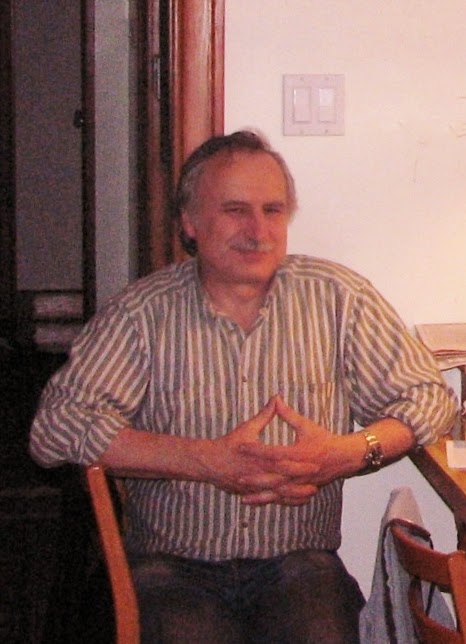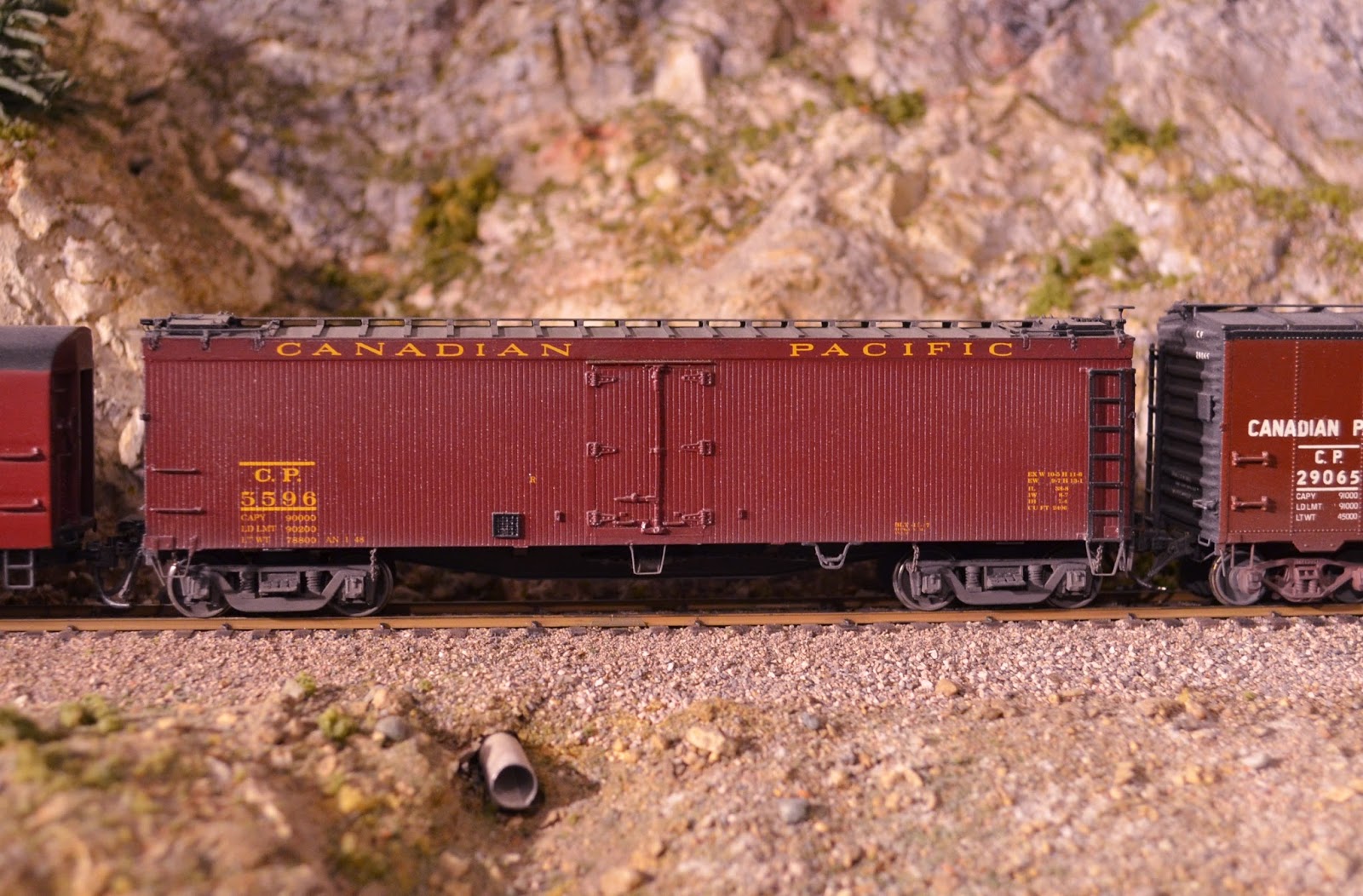 Our good friend, Dave Hanas, was a zealous modeler and collector of model trains and prototype photographs. He often visited our house to work on his models and the layout. The photo here was taken on one such occasion in 2006 after a fine meal prepared by my good wife.
Our good friend, Dave Hanas, was a zealous modeler and collector of model trains and prototype photographs. He often visited our house to work on his models and the layout. The photo here was taken on one such occasion in 2006 after a fine meal prepared by my good wife. Over the years, he painstakingly acquired and modified all the requisite passenger equipment to accurately model the trains appropriate to the Canadian Pacific Railway. In the process of acquisition and detailing he generously offered to place them on our layouts for the enjoyment of all who gathered to operate or view them.
In addition, he was a very, very fine friend and I had the good fortune to know him and share the hobby with him for about 20 years as did many of our mutual friends from the model railroading community in greater Vancouver. From early in our relationship, Dave and I made many trips to the BC interior for field research and to talk with the KVR veterans or to simply enjoy our beautiful province. In a memorial tribute to him we present here images and film of his beloved CPR passenger equipment. Dave Hanas died Yesterday at the age of 63. RIP.
We begin with this panorama shot of No. 12, the Kettle Valley Express with assisting engine 3628 on the point. Road engine is 5120, a long time KV passenger engine. She would originate in Vancouver at the downtown station and take the train all the way to Penticton where she would hand it over to another 5100 engine for the trip East to Nelson. A third engine would complete the run to Medicine Hat, Alberta. In the final years of steam, the newly rebuilt 5200's would often power this train and its opposite, No. 11.
Here is the pusher engine, 3628, still coal-fired but sporting a nifty power reverse. This engine was described in a June post. It is owned and operated by Q-Man.
The road engine is a Samhongsa product marketed by Van Hobbies in the 70's. They are somewhat rare and a very good model. Herb Mason (RIP) did some brass work to change the running boards and a smaller tender was added to match the prototype. We will do a post on the 5100's one day. Another iron horse from Q-Man's stable. She needs a repaint.
We now turn our attention to the consist in detail beginning with the head-end. "PASSENGER MERCHANDISE SERVICE" was the name applied to the boxcars that were added to passenger trains in the 40's and 50's. They carried express lcl freight to and from customers in the major towns across Canada. Each car in a train could be destined for a particular city or two such as Nelson, Cranbrook, or Penticton. They were boxcars randomly taken out of the series 226000-228799. They were originally built in 1937 and when selected for the new service were assigned a number in series 29019-29094. They were "EQUIPPED FOR PASSENGER TRAIN SERVICE" with passenger-style cut levers, steam and signal lines. Their paint scheme was modified by colouring the roofs and ends black. They retained the flat panel roof and square corners, 5/5 dreadnaught ends, Canadian ladders and wood roof-walks. The basis for this model was an Intermountain Railway Co. model kit (40799) with these specific features added.
 The next car is an express refrigerator car from series 5500-5749. This wood reefer has been beautifully hand-built by Andy W Scale Models who manufactures many unique Canadian cars in small batches. See his current offerings at: http://www.readytrain.com/catalog/index.html
The next car is an express refrigerator car from series 5500-5749. This wood reefer has been beautifully hand-built by Andy W Scale Models who manufactures many unique Canadian cars in small batches. See his current offerings at: http://www.readytrain.com/catalog/index.html
Here is a the first of three smooth side Light weight passenger cars, sometimes referred to as "Grove Cars" by modelers, imported by Van-Hobbies in two sets of three cars each. The model cars are of brass construction. Unfortunately, the three needed for a Kettle Valley Train come from the two different sets. These cars were custom painted in a very authentic maroon by Andy W. although my photo does not reproduce the colour here as well as the shot of the mail car following it. Dave spent a great deal of time tuning and modifying the trucks to operate well. This Baggage and Express Car, No 4234, is from series 4202-4246 and was likely built in 1948.
Mail and Express Car 3637, is one of 20 cars built in 1948 from series 3619-3638. Nicely reworked (in brass) baggage compartment and windows. As with the baggage car above the windows are neatly done with the security bars. Brass work and finishing by Andy W.
This First Class Coach (with Smoking Room) is one of the second set of smooth sides from the 2108-2128 series built in 1937. There was a later third order of narrow window coaches with a slightly different window configuration in series 2129-2178 which also appeared on the KV. Another, final series of smooth side coaches were built in 1947-49. They featured wider windows in a series numbered 2200-2298 and it was these cars which were eventually acquired by the British Columbia Railway for the Royal Hudson excursion train that ran to Squamish for many years. They did occasionally appear on the Kettle but the 2100 series were far more common. Coaches with single vestibules were usually run with the vestibule at the forward end. Again nicely finished by Andy W. A steady hand was needed for all those window frames!
The usual position for diners was between the day-coaches and the sleeping cars. This separated the cheap seats from the higher paying passengers occupying berths. (I know this from having worked one season in sleeping car service for the other national railway.) Diners were run on Nos. 11 and 12 between Vancouver and Coalmont where the Eastbound would set out the diner with her crew on the siding for pick-up by the Westbound. But actual meal service was only offered between Vancouver and Hope. By April of 1952, diners were replaced by buffet-parlor cars that ran through. This car is an "A" diner: as in "Aylesford". Car built and finished by BGR models: http://home.cogeco.ca/~bgrgroup/
Bringing up the rear of No. 12 are two sleeping cars of a variety known as "12 and 1". This configuration of 12 Sections and One Drawing Room was the most common sleeper of the twenties to the early fifties and the Kettle Valley was no exception. First we have "Naples" of the "N" series built in 1921-24. GTC Collectibles has a Stan Styles photo of this car at Hope on No. 12. Note the older Commonwealth trucks. This car has ice-activated air conditioning. Model built by BGR.
The second sleeper is one of the slightly more modern "S" series of 12 & 1, built in 1930-31. Severn Falls features improved Commonwealth trucks and the very obvious air conditioning duct work. Another nice model built and finished by BGR.
Here she is in a run-by further down the grade near Tunnel 3, Mileage 20.3. Someone had the foresight to take motion pictures in the last years of steam - and in colour!.
Next week we will continue our tribute to Dave Hanas with a close look at train Nos. 45 & 46. Thank you Dave for you fine work and for your friendship. May you find joy and peace in the presence of the Lord.
Coquihalla Man










Thank you Dave for all you shared. I enjoyed our conversations and you helped me be a better modeler and operator. Oh, those two H-Liners survived! Thank you also for lending your collection. The beautiful sight of #1 and #12 passing on the Vancouver Waterfront (I think those were the trains) is etched in my mind.
ReplyDeleteAnd thank you QM for the very fitting tribute and all your kindness.